Are you a parent who wants to help your kids learn Chinese but don’t know where to start? You don’t have to be a native speaker to teach your children Chinese, and there are lots of simple ways to help your kids learn the language. From incorporating Chinese learning activities into your daily routine to using online resources, these 10 tips will help your kids learn Chinese at home without a native speaking parent.
Disclosure: Some of the links included in this post are affiliate links.
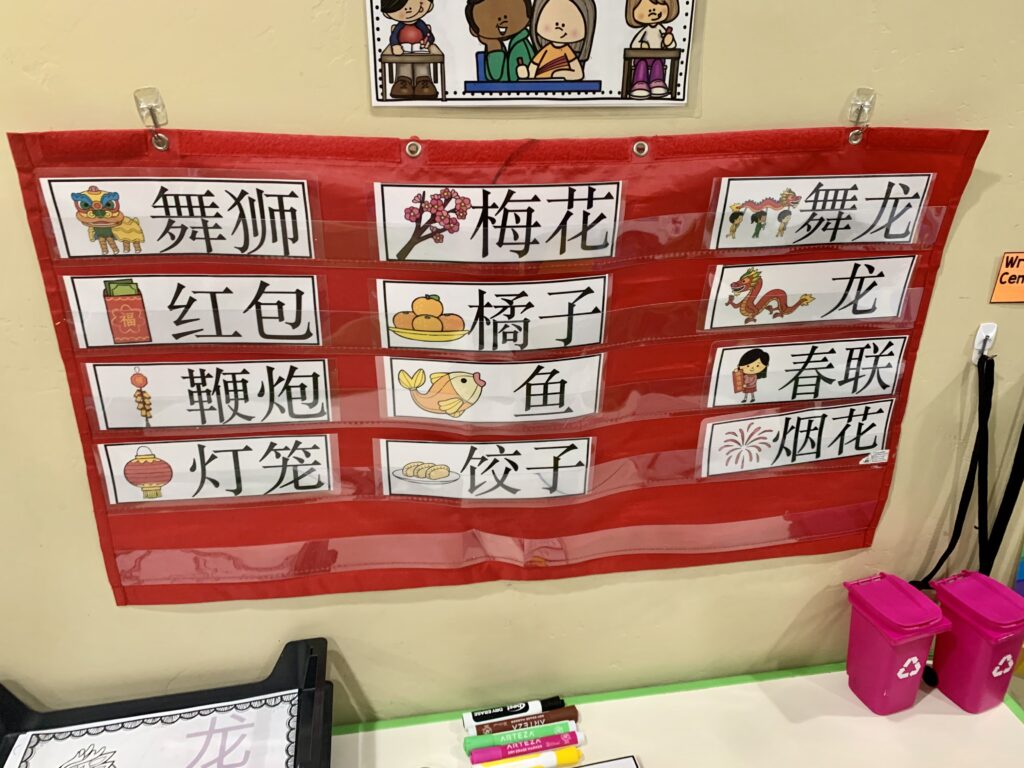
#1: Use Technology
There are many technological resources available for kids seeking to learn Chinese. Mandarin Chinese is one of the most widely spoken languages in the world, so what resources are available to families seeking to support Chinese learning at home?
One such resource is Virtual Chinese School. I’ve taken years of teaching experience and created an age-appropriate Virtual Chinese curriculum to help you and your child on your Chinese learning journey. The course has six weeks worth of video lessons and materials in Mandarin Chinese, but you have access for a full year to watch as many times as you want!
Another AI tool that we use at home is Luka – a Chinese book reading robot! I have a full post with more details about Luka, but he is a great support for those who do not read Chinese or who want their children to be more independent in their Chinese learning activities.
Another great support app is Ellabooks. This app houses thousands of Chinese books that show the text and read the audio for you child. We love it because it combines the best of visual and audio together rather than only looking at books or only listening to audio books. It’s similar to Luka except you don’t have any physical copies in front of you.
Technology can be an incredibly powerful tool in helping kids learn Chinese, as it offers a level of engagement and interactivity that traditional learning methods often lack. By incorporating technology into your child’s language-learning routine, you can help them to build a strong foundation in Mandarin Chinese that will serve them well for years to come.
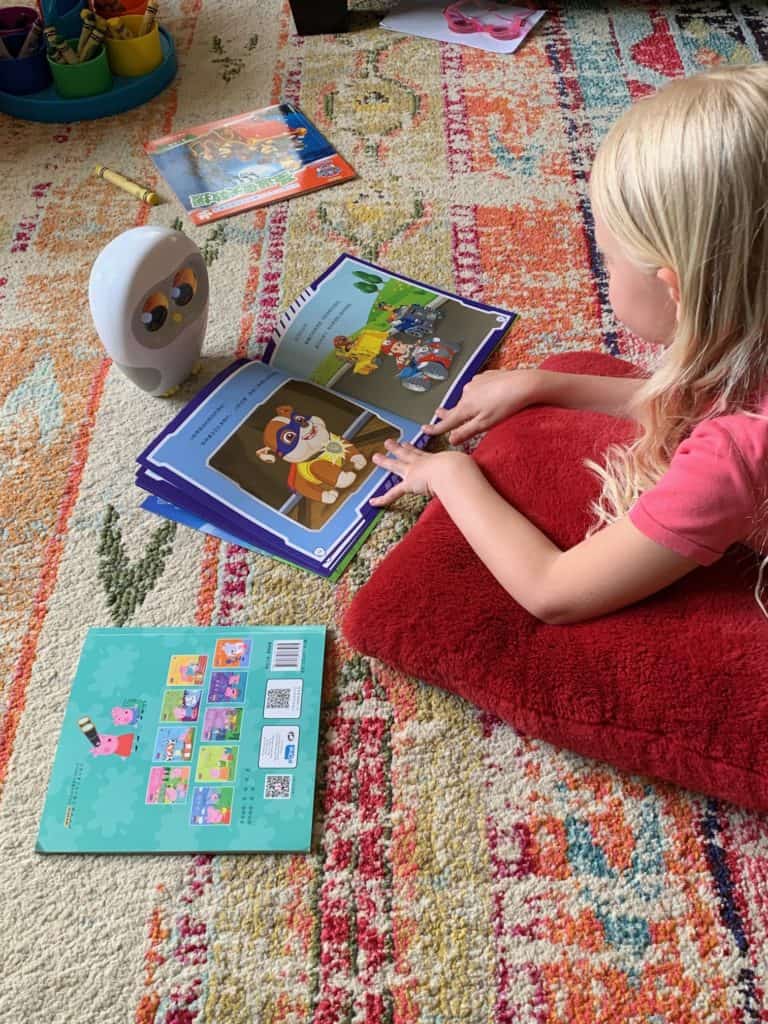
#2: Make it a Game
Learning Chinese doesn’t have to be boring. In fact, one of the best ways to help kids learn Chinese is to turn it into a game. Games are not only fun, but they also encourage children to use and practice the language in a natural and relaxed way.
So how can we use games in language learning? First, think about what types of games are supportive to language learning. For example, games that involve matching words or phrases, like memory or bingo, can help kids learn new vocabulary. Games that involve storytelling, like role-playing or Mad Libs, can help kids practice their grammar and sentence structure.
You can also turn daily routines into games. For example, you can play “I spy” using Chinese words for objects around the house, or you can turn dinner time into a game by having everyone take turns saying a Chinese word or phrase related to the meal.
To make it even more fun, get creative with rewards. For example, if your child learns 10 new Chinese words, they can earn a sticker or a small prize. Or, if your child can have a conversation with you in Chinese, you can have a special family movie night or outing.
Overall, making Chinese learning into a game is a great way to help kids learn Chinese. It keeps the learning process engaging and enjoyable, and encourages kids to use the language in a fun and natural way.
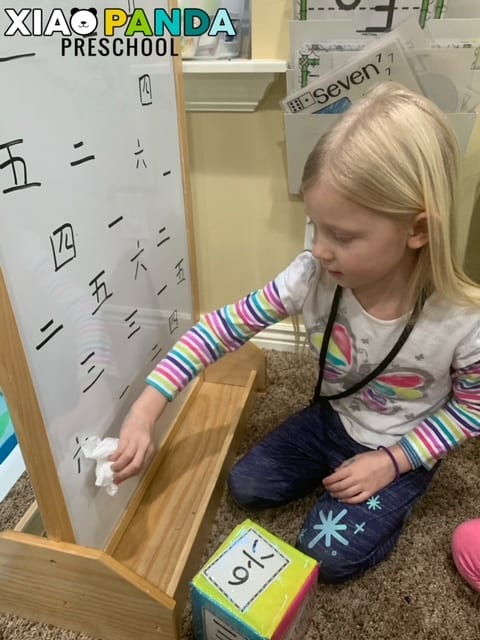
#3: Set Aside Dedicated Time Each Day
One of the most effective ways to help your kids learn Chinese is to set aside dedicated time each day. This could be as simple as 15 minutes after dinner or 30 minutes before bedtime. Start with simple baby steps, don’t expect perfection right away. It takes time to develop habits and increase the amount of time you use Chinese slowly.
To make this task easier, you can try incorporating Chinese resources, such as Chinese learning apps, flashcards, and Virtual Chinese School. The key is to make this time fun and engaging for your kids, so they will look forward to it every day.
If you don’t speak Mandarin Chinese yourself, don’t worry. You can use resources such as videos and audio recordings to learn along with your kids. Try some songs and stories from my Chinese Youtube Channel for Kids.
Additionally, you could use situations rather than time restraints. For example, we started only speaking Chinese in the car and then at the grocery store and you can slowly add more and more situations that you have a habit of doing in Chinese.
Setting aside dedicated time each day shows your children that learning Chinese is important and helps them to develop a consistent language routine. Remember, practice makes perfect and over time your child’s Chinese language skills will improve.
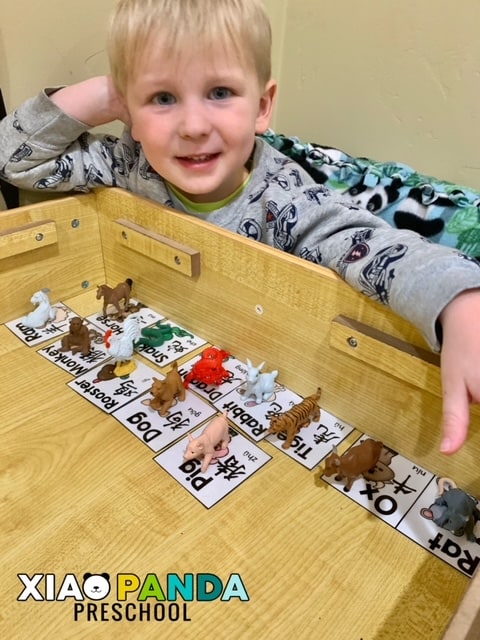
#4: Speak Slowly and Clearly
When trying to help your kids learn Chinese, it’s important to remember that pronunciation and clarity are key. Even if you are not a native Chinese speaker, you can still practice speaking the language slowly and clearly so your kids can hear each syllable.
When practicing Chinese with your kids, remember to take your time and speak each word slowly and deliberately. This will help your kids understand each individual sound and make it easier for them to mimic you. Additionally, you can use props like flashcards to reinforce each word you say.
Another tip for speaking Chinese with your kids is to use songs or rhymes. Here are some printable song cards you can try. Singing a simple Chinese song together can be a fun and effective way to help your kids learn new words and phrases. Don’t worry about being perfect, just have fun and practice together. You can learn some songs from my Youtube channel as well.
Remember, practicing Chinese with your kids doesn’t have to be intimidating. With a little patience and practice, you can make it a fun and interactive experience that your kids will enjoy. So go ahead, speak slowly and clearly, and watch your kids thrive as they learn Chinese!

#5: Repeat, Repeat, Repeat
Learning Chinese can be a daunting task for anyone, but especially for young children who are still developing their language skills. One effective way to help them learn is through repetition. The more they hear and use Chinese, the more familiar and comfortable they will become with the language.
Repeating Chinese phrases and vocabulary words is an excellent way to reinforce their learning. You can make it a game by practicing with flashcards or by having your child repeat after you. There are also many online resources that offer audio and video lessons to help children practice speaking Chinese.
Another way to incorporate repetition into your child’s language learning is through songs and rhymes. There are plenty of Chinese children’s songs and nursery rhymes that are easy to learn and catchy, making them an enjoyable way for kids to practice their Chinese. You can try the Chinese song cards I made or watch some songs in Chinese on Youtube.
It’s important to remember that repetition takes time, patience, and consistency. By making repetition a regular part of your child’s Chinese learning routine, you will be helping them build a strong foundation in the language. Over time, they will become more confident and proficient in their Chinese language skills.
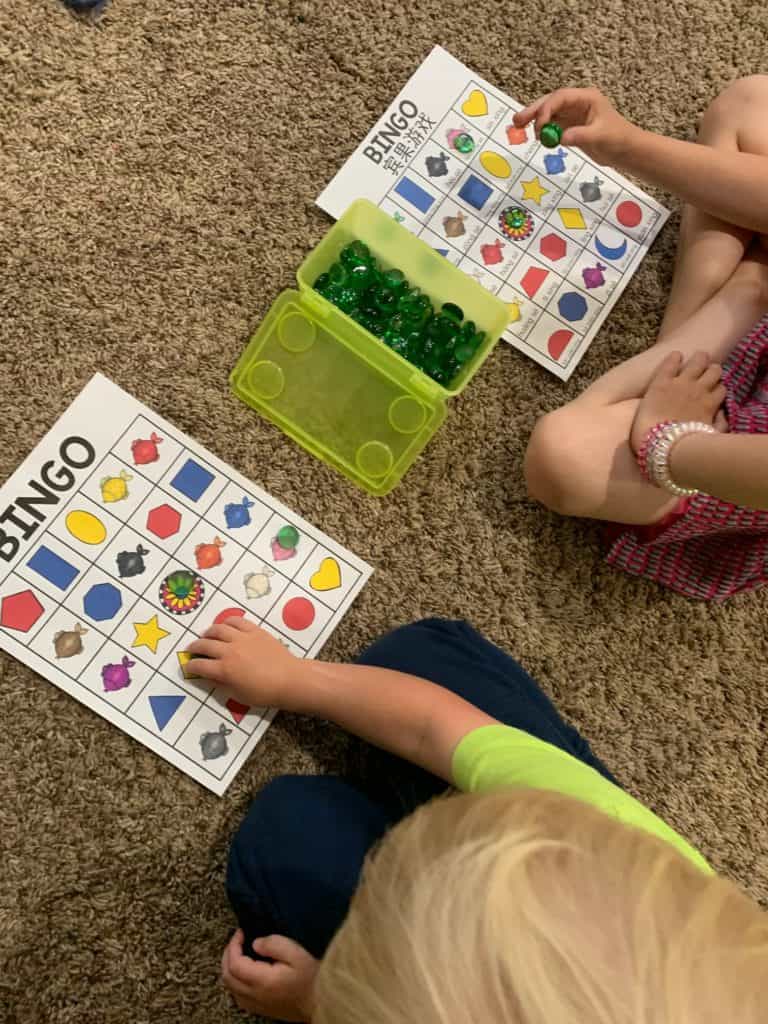
#6: Encourage Questions
Encouraging your child to ask questions is an essential aspect of learning any language, and Chinese is no exception. As a parent, it’s important to create a safe and welcoming environment where your child feels comfortable asking questions about Chinese. When your child asks questions, make sure to provide detailed and informative answers to help them understand the language better.
One way to encourage your child to ask questions is by incorporating Chinese into your daily conversations. For example, if you’re at the grocery store, you could point to different fruits or vegetables and ask your child what they’re called in Chinese. By doing this, you’re not only teaching your child new vocabulary but also showing them that it’s okay to ask questions.
Another helpful tip is to use materials, such as books, flashcards, and online resources. These resources are designed to help children learn Chinese in a fun and engaging way, and they often include interactive activities that encourage children to ask questions. Additionally, these resources are specifically designed for parents who don’t speak Chinese, so they are easy to use and understand.
Lastly, try to be patient and understanding when your child asks questions about Chinese. Learning a new language can be challenging, and your child may feel frustrated at times. Encourage them to keep practicing and reassure them that mistakes are a natural part of the learning process. By doing so, you’ll create a positive learning environment that will help your child thrive and develop a love for the Chinese language.

#7: Write it Down
Another effective way to help your kids learn Chinese is by having them practice writing it down. This is especially important if your child is at the stage where they are learning Chinese characters.
Get them some Chinese writing books or create your own with some lined paper and a marker. You can even create fun tracing exercises by writing Chinese characters and having your child trace them with their finger or a pen.
Another fun idea is to have your child create a Chinese vocabulary book where they can write down new words they’ve learned and draw pictures to help them remember. You can also encourage them to practice writing Chinese by creating grocery lists or to-do lists in Chinese.
Writing down Chinese characters will not only help your child memorize them but will also improve their handwriting and motor skills. So grab a pen and some paper and get writing!
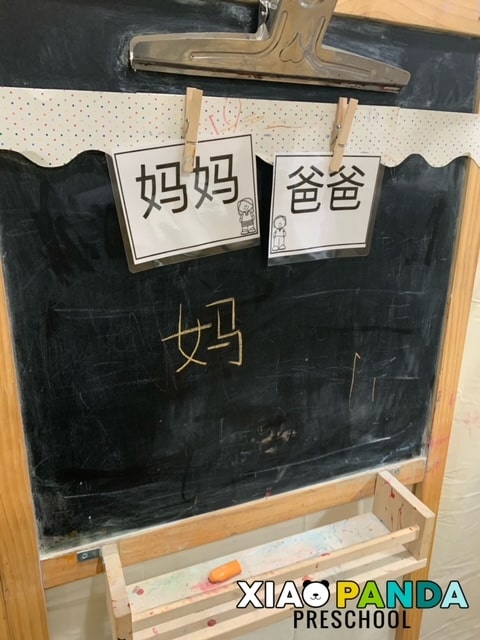
#8: Connect it to Something They’re Interested In
Kids are more likely to learn and retain new information when it’s connected to something they’re already interested in. If your child loves animals, for example, try to incorporate vocabulary related to animals in your Chinese lessons. Use picture books, flashcards, and other materials that showcase animals while teaching the corresponding Chinese words. If your child enjoys sports, teach them sports-related vocabulary in Chinese. Encourage them to practice using these new words when watching or playing sports.
You can also find Chinese-language versions of your child’s favorite TV shows, movies, and books. This is a fun way to help them learn Chinese while enjoying something they already love. Make it a routine to watch a Chinese show or movie with your child once a week or read a Chinese book before bedtime.
Another way to connect Chinese learning to your child’s interests is by finding Chinese cultural events in your community. This could be a Chinese New Year celebration, a Chinese food festival, or a traditional Chinese music concert. Exposing your child to Chinese culture can pique their interest and make them more motivated to learn Chinese.
Overall, incorporating your child’s interests into their Chinese learning will make the process more engaging and enjoyable for both you and your child. It’s a win-win situation where your child gets to learn Chinese while doing something they already love.

#9: Find a Tutor or Exchange Student
Another way to help your kids learn Chinese is to find a tutor or exchange student. If you have access to a local university or college, you may be able to find a Chinese student who is willing to help teach your kids. This can be a great way for your kids to learn from a native speaker and also get exposure to Chinese culture.
If you are not able to find a tutor or exchange student locally, there are online resources that can help. Virtual Chinese School provides interactive and age-appropriate online lessons in Chinese that you can watch anytime or watch over and over again. This can be a great option if you are unable to find someone locally.
In addition to traditional tutoring, there are also language immersion programs that can provide a more immersive experience for your kids. Some of these programs offer homestays with Chinese families, which can give your kids a chance to practice their language skills in a real-world setting.
No matter which option you choose, it’s important to find a tutor or exchange student who is a good match for your family and your child’s learning style. You should also make sure to communicate your goals and expectations clearly, so that you can work together to help your kids learn Chinese.

#10: Visit China or Taiwan
If you’re able to take your family on a trip to China or Taiwan, this can be an incredibly valuable experience for helping your kids learn Chinese. Not only will they have the opportunity to hear and speak Chinese in a real-life context, but they’ll also gain cultural exposure that can help deepen their understanding of the language.
Before your trip, encourage your kids to practice basic phrases and vocabulary that they can use while interacting with locals. Once you’re there, try to incorporate Chinese as much as possible – order food at restaurants, ask for directions, and engage in small talk with shopkeepers. Your kids will see how useful the language is in everyday life, which can be motivating for continuing to learn once you return home.
If you’re not able to travel abroad, consider finding Chinese cultural events or festivals in your local area. These can be a great opportunity for your family to practice Chinese while also immersing yourselves in the culture. Whether it’s through travel or local events, exposing your kids to Chinese culture and language in real-life contexts can be a powerful way to help them learn and grow.
Conclusion
Learning a new language can be challenging, but with a little creativity and effort, it can also be a fun and rewarding experience for both parents and children. By incorporating these 10 simple tips into your daily routine, you can help your kids learn Chinese and even pick up some new language skills yourself! Whether it’s using technology, making it a game, or connecting it to something they’re interested in, there are plenty of ways to make learning Chinese fun and engaging. Remember to be patient and consistent, and with time, your children will start to build their language skills and gain confidence in their abilities. Happy learning!

